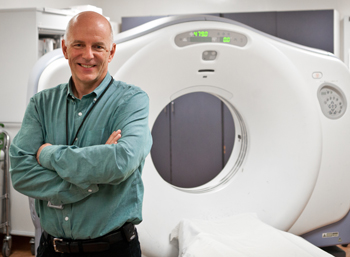New tool helps radiologists study ordering patterns to reduce unnecessary tests

By Kelly O’Brien

Dr. Bruce Gray says he hopes the clinical decision support system will be a positive and engaging experience for family practice physicians. (By Yuri Markarov)
St. Michael’s Hospital plans to install a clinical decision support system in the hospital’s family practice clinics to study how to improve the appropriateness of imaging tests ordered by physicians.
Health-care providers across the country suspect a large number of MRIs and CTs ordered and performed in hospitals are unnecessary.
“Unnecessary tests also contribute to longer wait times and potentially decrease access for patients who need the tests urgently,” said Kate MacGregor, the quality improvement and radiation protection manager in the Department of Medical Imaging. “Unnecessary tests can also potentially put patients’ health at risk. Some tests use ionizing radiation, so from that standpoint it’s a public health problem.”
The concept of the clinical decision support system is relatively simple. When ordering a test, clinicians will enter patient information into a computer, such as symptoms and relevant medical history. The software will then display whether the test should be ordered, or whether a different test would be more appropriate. The clinician will have the option to override the recommendation.
“We’ll then be able to identify how often each clinician is overriding the system, and what types of cases they are overriding most often,” said Dr. Bruce Gray, a radiologist and one of the project leads. “When we see they’ve been overriding, we can ask, why is that? Maybe they have a legitimate reason for overriding it. We hope to make this a positive and engaging experience for the family practice physicians.”
The tool is designed to be combined with the patient’s electronic health records, with only a few clicks needed to determine whether a test is appropriate.
A number of hospitals throughout North America use similar software to determine whether an imaging test is appropriate. What’s different about the St. Michael’s project is that it will be the first in Canada to use a clinical decision support tool embedded with appropriateness rules tailored for the Canadian context.
Did you know? The clinical decision support system will serve 80 family practice physicians and 60,000 patients. |
The system will also improve the ordering process for imaging tests for both patients and clinicians. Currently, the ordering of imaging tests is almost entirely paper-based and goes through a number of people and departments before an appointment is scheduled. The clinical decision support system will be added to the ordering process electronically to give the patient an appointment at the same time the test is ordered.
Dr. Gray said this increase in efficiency will be a main selling point for family physicians to use the system.
But before the group leading the project can assess the effectiveness of the clinical decision support tool, they first have to determine what the current ordering patterns are.
The team is using a natural language processing tool called Montage to understand these baseline ordering patterns and better evaluate the effectiveness of the clinical decision support system when it’s installed in the spring.
Ultimately, the tool won’t reduce the cost to the system, but it will help ensure each dollar spent was an appropriate one, said Dr. Gray.
“You want to have value for whatever you do and increasing appropriateness will increase value.”
About St. Michael’s Hospital
St. Michael’s Hospital provides compassionate care to all who enter its doors. The hospital also provides outstanding medical education to future health care professionals in 27 academic disciplines. Critical care and trauma, heart disease, neurosurgery, diabetes, cancer care, care of the homeless and global health are among the hospital’s recognized areas of expertise. Through the Keenan Research Centre and the Li Ka Shing International Healthcare Education Centre, which make up the Li Ka Shing Knowledge Institute, research and education at St. Michael’s Hospital are recognized and make an impact around the world. Founded in 1892, the hospital is fully affiliated with the University of Toronto.
